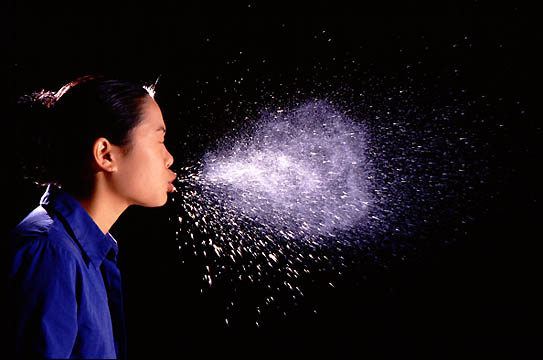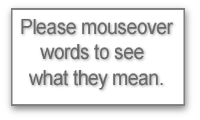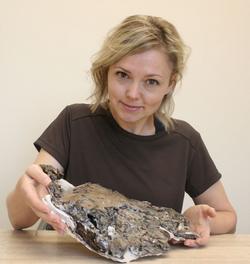Science news in brief
18-April-2009
Spit, tweet and twitter

The research below, chosen from hundreds of papers published this week, range from the science of spit to CT scans of ancient turtles. There are hardy microbes, massive galaxies, and nuclear energy. Take a look:
10-Apr-2009 Discovery challenges theories of galaxy birth
A team led by an Indiana University astronomer has found a sample of massive galaxies with properties that suggest that they may have formed relatively recently. This would run counter to the widely-held belief that massive, luminous galaxies (like our own Milky Way Galaxy) began their formation and evolution shortly after the Big Bang, some 13 billion years ago.
12-Apr-2009 Recycling nuclear fuel is a prudent move
President Obama's decision to slash funding for the Yucca Mountain nuclear waste repository in Nevada may seem Draconian. It offers, rather, an occasion for imagination and innovative planning.
13-April-2009 Tweet this: Rapid-fire media may confuse your moral compass
Emotions linked to our moral sense awaken slowly in the mind, according to a new study The finding suggests that digital media are better suited to some mental processes than others. "For moral decision-making ... we need to allow for adequate time and reflection," said author Mary Helen Immordino-Yang.
14-Apr-2009 Spit anyone?
Mark Nicas has given some of his best years to spittle. He builds models – the mathematical kind – of how someone else’s slobber ends up on you.
14-Apr-2009 Researchers study signaling networks that set up genetic code
Researchers at the University of Illinois have identified and visualized the signaling pathways in protein-RNA complexes that help set the genetic code in all organisms. The genetic code allows information stored in DNA to be translated into proteins.
14-Apr-2009 People's misperceptions cloud understanding of weather forecasts
If Mark Twain were alive today he might rephrase his frequently cited observation about everyone talking about the weather but not doing anything about it to say, "Everyone reads or watches weather forecasts, but many people don't understand them." New research shows only half of us know what a forecast means when it predicts a 20% chance of rain.
16-Apr-2009 Microbes thrive in harsh water under glacier
"It's a bit like finding a forest that nobody has seen for 1.5 million years," says Ann Pearson, Associate Professor of Earth and Planetary Sciences at Harvard. "Intriguingly, the species living there are similar to contemporary organisms and yet quite different - a result, no doubt, of having lived in such an inhospitable environment for so long."
16-Apr-2009 Natural fail-safe mechanisms rule out another Chernobyl
Terrible as Chernobyl was, the incident has little relevance to current debates about nuclear power. It was the result of design flaws, poor maintenance and appalling disaster management, and could not have happened with the modern technologies under consideration now
16-Apr-2009 Prehistoric turtle gets CT scan in search for eggs and embryos
Michael Knell carried a 75-million-year-old turtle into Bozeman Deaconess hospital recently, then laid it carefully on the bed that slides into the CT scanner. Hardly an ordinary patient, the turtle fossil was only the second in the world found with eggs inside it, said Knell, a Montana State University graduate student in earth sciences. .
Education resources, classroom activities, cool stuff
Galaxy formation
Kitt Peak educational resources
Energy matters
Yucca Mountain from Teachers' Domain
What are spent nuclear fuel and high-level radioactive waste?
Assessing the quality of websites
It's all there on the net, if you can find it
Transcript of 19 April 2009 podcast:
Paddling in the online ocean

One of the main aims of Real Science, when we set it up, was to help teachers and pupils navigate the oceans of online information. There are wonderful science websites out there, but how many teachers have the time to find them, or to separate the good from the average, the interactive and engaging from online textbooks that no young person would read?
Ian McCracken, learning resources manager at Govan High School is convinced that we've got it wrong about kids and computers: "It's true that pupils enjoy using computers but it's usually for exciting, interactive games. It's quite a jump to say this means they will enjoy learning online – or know how to do it."
The e-literacy skills that young people need, aren't being taught and don't always use even when they are, include choosing and using good keywords for searching, refining a search and knowing how to navigate a relevant website, assuming they can find one.
Real Science aims to help by finding good science websites and resources and linking them to a meaningful context, through the news stories and discussion topics. A large list of useful websites is pretty useless, I find. Look at browser bookmarks, for instance. Or is that just mine?
Who is this guy?
One of the hardest problems facing young people looking for online information is assessing how reliable a site is. Can you trust the information it contains? Largely yes if it's BBC or NASA, but that's a tiny fraction of what's out there.
It's like the problems young people face when chatting to online "friends" they haven't met. How do they know that 15-year old Lucy who likes La Roux isn't 45-year-old Fred who likes young girls? Similarly in science Professor Kleinpoppen from Princeton University writing about nuclear energy could easily be Alec Armstrong from Auchinleck airing his ill-informed opinions.
I remember my dad settling discussions sometimes when I was young with "It's true – I read it in the paper." It always annoyed me. But it was a clincher he stopped using as soon as his son started writing for the papers – and he realised journalists were mostly ordinary guys who did their homework.
There are plenty of ordinary guys online, and not all of them have done their homework. There are also sites that peddle misinformation . Separating the good quality online sources from the prejudice, drivel and plain lies is one of the most valuable e-literacy skills.
Who are these guys?
A web search on "climate change" for instance returns reputable sites that communicate the scientific consensus – certainly in the first handful of pages, which is all most people look at.
But try searching on "global warming". As of today (15 April 2009), the third hit is a site called GlobalWarming.org, which looks and sounds like the real deal. It's professionally presented with an authoritative feel.
But look at it more closely. Try these extracts from the front page: "Here we go again with the Wilkins ice shelf." "Who's the biggest environmental hypocrite?" "Cap and trade hurts the little guy." "Green agitators." "Alarmists get their wish."
The entire site in fact is a platform for climate change deniers, funded no doubt by some of the same businesses that were part of the supposedly disbanded Global Climate Coalition – which set out to present climate change science as "just a theory", and succeeded with large sections of non-scientists.
First steps
There is no way of telling from the website GlobalWarming.org itself who they are. The rationale behind the site is nowhere explained, nor is its funding identified, nor the individuals who run it.
All these are basic first steps in assessing the credibility of websites. But Ian McCracken's point is that nobody in schools is currently teaching these steps – except for a few enlightened librarians and resources managers.
Real Science is a first filter. But we're not infallible. As science teachers we need to be providing guidance on good sites to the pupils and, if we've time, teaching some of the basic skills so they can assess websites themselves. Take a look for instance at the links to the Open University, Alberta University and Cosby High, for some good guidance on this.
Energy facts
So what's all that got to do with this week's stories? Well one of the biggest issues around is how we can generate all the energy we need. Coal, oil and gas are damaging the climate and won't last forever. So do we stick wind turbines on every hill? Do we go nuclear in a big way? If we replace dirty old oil with clean, green biofuels can we still feed the world?
These are tough questions and ferreting out the facts among the myths, misconceptions and bald assertions is not easy. Real Science will return to energy again in the months ahead. It's hard to find any scientific issue as important.
So in searching for websites on energy generation we found one that seems useful for all sorts of issues and implications. It's called ProCon.org. Unlike GlobalWarming.org this site clearly states what it's for, who funds it and why.
On the one hand...
Their aim is to promote "critical thinking, education and informed citizenship by presenting controversial issues in a straightforward, non-partisan pro-con format." What that means is they outline the background and the straightforwad stuff about an issue, then they quote a bunch of "experts" on both sides of the arguments.
Topics tackled in this way include the death penalty, illegal immigration and Iraq. In science there's sport and drugs, genes and sexuality, and alternative energy. There's also one on nuclear power, but since it hasn't been updated since 1988, it's not too topical.
The format provides a useful starting-point for science class discussions, and there's a page of links to online lesson plans.
On the other
There is one flaw in this whole pro-con approach, evident to anybody who reads the newspapers – where science stories are often marred by something called journalistic balance. Most journalists and editors are arts- and literature-educated, and are out of their depth with science. They can't apply the fine-tuned critical faculties that serve them well with stories about politics, literature and people.
So in science stories that have important issues and implications, they will often quote someone who takes the opposing view – Alec Armstrong from Auchinleck, maybe, or Bjørn Lomborg from Denmark.
In the interests of journalistic balance they play right into the hands of the climate-change-is-only-a-theory crowd, the evolution-can't-explain-the-human-eye mob, or the stem-cells-are-the-work-of-the-devil characters.
Credibility
ProCon.org tries to solve this problem by giving a credibility rating to every individual or organisation they quote. It's a great idea but quite hard to do in practice, they admit.
This website looks valuable to me for science teachers who want to get pupils exploring facts and discussing issues. Have a look.
That's all for this week from Real Science. Thanks for listening.
Keep thinking.
More help with words
ICT, analysis, breed, cell, evaluation, fertile, fossil fuels, fossilised, membrane, protoplasm, species, techniques, technologies



